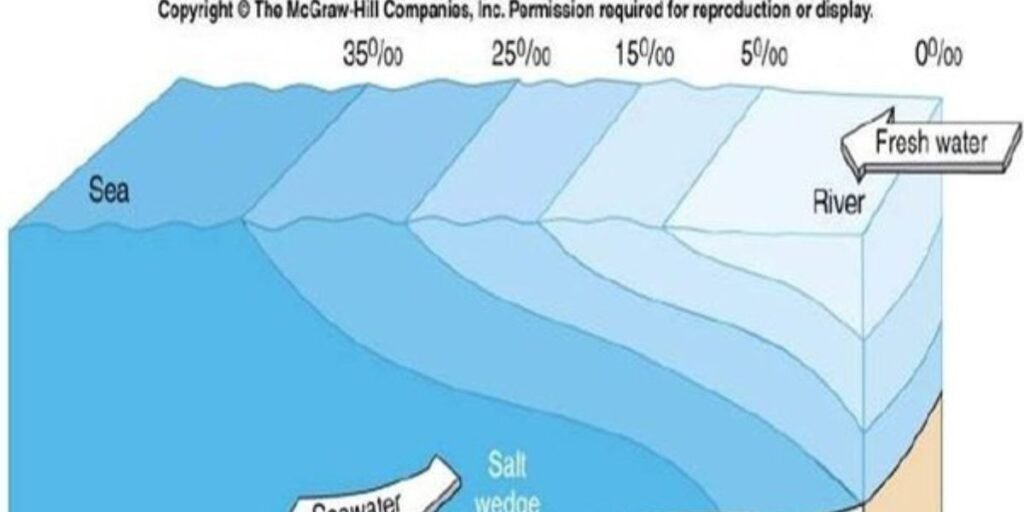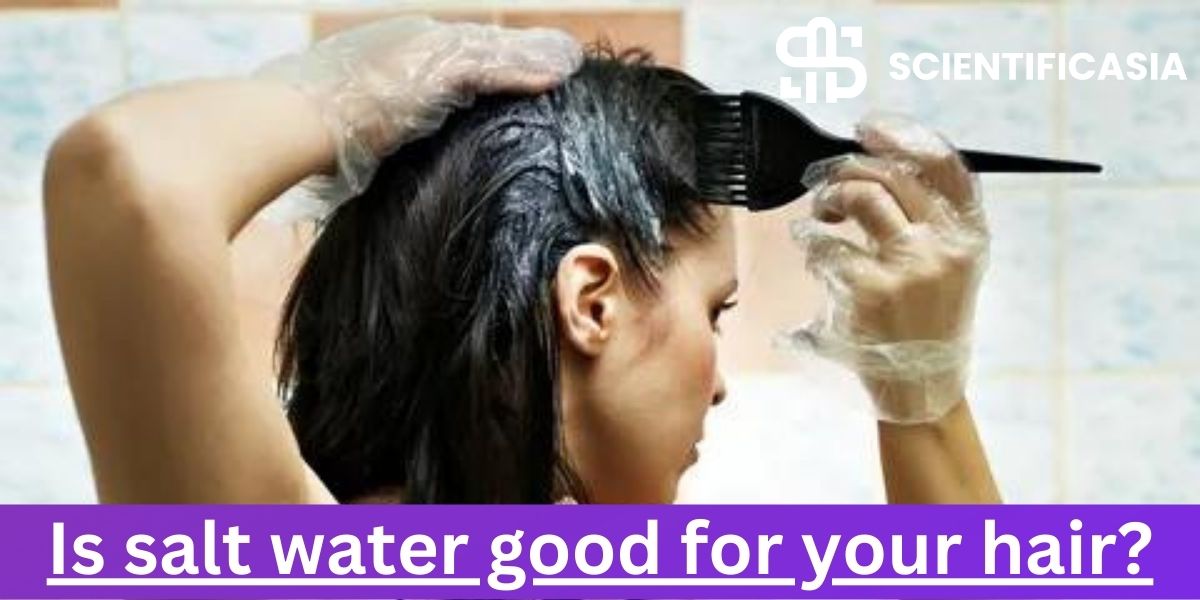You might opt to visit the beach as summer draws near and the days get warmer, but even while taking a swim in the ocean might be soothing, you might be concerned about what would happen to your hair if you dipped it in seawater.
Although there is a lack of scientific evidence regarding the effects of saltwater on hair, it is evident that saltwater does have an effect because some hair products on the market contain saltwater directly. However, these products are designed to style hair, not to address the question of whether or not saltwater is good for hair.
Sunlight and saltwater go hand in hand, and this is when hair damage is most likely to occur; the sun’s strong UV rays, the drying effect of the saltwater, and the hot, dry air can all harm hair. In addition to discussing the potential benefits of salt water for hair, this article will also address the potential harm it can do to hair and how to shield your locks from its damaging effects.
Scientific proof supporting the benefits of saltwater for hair health or its potential to harm hair is lacking. The results of saltwater on hair might vary depending on how it is used or interacts with the hair, as you will see throughout this article. Saltwater can have both beneficial and negative impacts on hair.
In terms of advantages for hair, saltwater can provide body and structure, particularly for people who want “beachy waves.” However, in terms of drawbacks, saltwater can deplete hair of its natural oils, make it brittle, and even break it. It’s critical to limit the amount of saltwater that comes into contact with hair when swimming in the ocean or using any form of saltwater, and to wash and moisturize the hair afterward.
The Study of Saltwater Science

Is salt water good for your hair? The main ingredient in saltwater is sodium chloride, or salt, dissolved in water. Because of its special qualities, it can have a favourable or negative effect on our hair when it comes into contact with it. Although there isn’t much scientific proof to back up the reputation of saltwater’s ability to cleanse skin, it nonetheless possesses this quality. It does, however, include antimicrobial elements including zinc, magnesium, potassium, selenium, and amino acids.
Because deep ocean water is found at depths of 200 metres or more, its mineral-balancing and toxin-reducing properties may help with skin diseases like eczema. This water has been associated with treating skin conditions such as cracking, irritation, dryness, itching, and swelling because it is less exposed to sunlight and has fewer microorganisms. It also holds more nutrients.
As an exfoliator, saltwater can get rid of extra oil, debris, and dead skin cells. Numerous physicians believe that the abundance of minerals in seawater helps with a variety of skin issues. Saltwater can, however, lessen the appearance of scars and acne while also encouraging skin cell renewal, so people with sensitive skin should use caution.
Now let’s talk about salt water for hair. Because of its hygroscopic properties, saltwater can form salt crystals that absorb moisture from hair strands, making hair brittle and dry, especially for hair that has been chemically treated or dyed. Before swimming in salt water, oiling your hair can help prevent damage and colour fading.
Is Ocean Water good for Your Hair?
The Science Behind Redox Skincare and Its Multifaceted Benefits
How does salt water work?

Naturally, salt and water are the only two components of salt water. It’s also a good idea to know exactly what minerals sea salt contains, which include the following:
- Magnesium
- Calcium
- Chlorine
- Beryllium
Depending on the type of salt, different minerals have varying amounts in it. Table salt contains far more sodium per gramme than sea salt, and sea salt has much larger granules. This may have somewhat varied effects on the hair.
How to Wash Hair with Salt Water

Is salt water good for your hair?
Saltwater may be a good option for you if you want a little extra texture and have greasy hair. These are the two most effective methods for applying saltwater to hair.
1. Hairsprays with salt
Without a doubt, the simplest technique to get salty water on hair is using salt hair sprays. To add extra body to your hair, simply spritz the bottle through your hair, paying particular attention to the roots. You are free to add as little or as much as you desire! Salt hair sprays are widely available in stores, and many of them include additional substances for added protection. However, you can easily make your own at home using salt, water, and a spray bottle.
2: Taking a Dip in the Sea
Swimming in the sea can expose your hair to salt if you’re fortunate enough to live near the seaside! Just take a swim, then savour the added body and texture in your hair. The term “beach waves” is not without meaning.
Is salt water pools good for your hair?
Yes, chlorine can be harmful to your hair’s health since it depletes it of its natural oils, much like salt water can. As a result, after swimming in a pool, you could feel dry hair and possibly breakage. This is one of the reasons why a lot of competitive swimmers wear swim caps all the time: it keeps their hair from breaking off and becoming damaged over time. Additionally, chlorine can alter the colour of hair. Chlorine can even turn blonde hair that has recently been bleached blonde green.
Want Assistance With Hair Loss?
In a pinch, using salt water to give your hair more body could be a useful technique. That can, however, only be a temporary solution and cause further harm. It is not advisable to use salt water if you are experiencing hair loss. You ought to concentrate on alternative hair repair options instead.
Modern FUE hair transplantation is our specialty at Harley Street Hair Clinic, where we assist patients in growing a complete head of hair. We have the best surgeons and sophisticated equipment to help you get your hair back to its most voluminous, healthy state.
Is salt and water good for your hair?
A day at the beach is sheer bliss—the feeling of sand between your toes, the roaring waves, and the salty wind. However, what impact would such briny water have on your priceless hair? Should you grab that shower cap as soon as you set foot in the sand, or is salt water good for your hair?
In actuality, water and salt have opposing effects on your hair. By eliminating dead skin cells and product buildup from your scalp and giving your hair more body and structure, salt can work as a natural exfoliator to give you those desired beachy waves without the need for styling products. Furthermore, your hair and scalp might benefit from the minerals in salt water. But that same salt can also be drying and harmful, depriving your hair of its natural hydration and increasing the likelihood that it will break. Is it, then, good or bad?
Depending on what! Salt and water might be your friends if you have oily hair, dandruff-prone scalps, or fine hair that needs volume. However, it’s essential to take preventative measures like rinsing with fresh water after swimming and using a deep conditioner to avoid the drying effects if you have dry or damaged hair, color-treated hair, or hair that is prone to frizz. In the end, pay attention to your hair and take occasional trips to the water!
Is sea salt water good for your hair?

Is salt water good for your hair? The kiss of the water can make your hair sing a love story. Its briny kiss gives a seductive volume and texture, but it can also hint at damage and dryness. Because of its strong exfoliating properties and ability to remove build-up and improve scalp health, sea salt water can leave hair feeling parched and dry. It’s a pleasant wave for fine hair looking for volume and greasy scalps. However, it’s best to proceed with caution when dealing with color-treated beauties and those with frizz-prone hair, rinsing with fresh water and using conditioners to prevent the beachy waves from becoming fragile whispers. Thus, pay attention to your hair, carefully reap the rewards, and allow the sea to be your hair’s irrational buddy rather than its enemy.
How about seawater?
When someone refers to “salt water,” they could be referring to saltwater or salt-containing water. Seawater contains additional minerals, but salt water is just water with salt in it. This is the main distinction between the two.
The two most common minerals in saltwater are sodium and chlorine, as you can see below.
Although you may be thinking of the overpowering chlorine found in swimming pools, seawater contains a distinct kind of chlorine. Whereas the chlorine in swimming pools is dissolved chlorine gas (Cl2), an aggressive chemical that isn’t found in nature, the chlorine in saltwater is in the form of a chloride ion (Cl-), a component of table salt and a harmless element.
Ocean water’s mineral composition:
- Chlorine: 55%
- Sodium: 31%
- Magnesium: 7.7%
- Sulphur: 3.7%
- Calcium: 1.2%
- Extra: 1.4%
Although there isn’t any scientific proof to back up the claim that these minerals hurt hair, it’s crucial to remember that chlorine (Cl2) would only cause problems if you regularly used a swimming pool without washing your hair afterwards.
Regarding the impact of seawater’s salt content, if hair is left unwashed, salt crystals may accumulate in it and cause damage like brittleness.
How is hair harmed by saltwater?

Because seawater contains a high concentration of minerals and vitamins, it can be used for wound healing, skin detoxification, and reducing edoema. It’s crucial to recognise that it might have negative impacts on your hair.
Let’s first accept that moderate exposure is harmless. If you use seawater wisely, it can even be advantageous. However, summertime heat waves and persistent salinity can lead to hair loss or other kinds of damage to the hair.
Wicking away moisture
Because of its high water content, your hair is supple, elastic, and moisturising just like your skin. In that sense, excessive moisture loss can cause hair to become dehydrated.
Seawater’s strong salinity can suck moisture from your hair and scalp. Because saltwater has a purifying impact, it may also help reduce the natural oils in your scalp.
After visiting the beach, you might observe that blow-drying your hair will take longer, or that curling or keeping a style will be difficult. Hair gets dry, brittle, and more delicate after losing moisture and its natural oils.
Frizzing and twisted strands
Furthermore, saline water may disrupt several bonding interactions and produce new cross-links within hair strands. Therefore, in addition to providing your hair with gorgeous beach waves, salt water can weaken it and remove its luster and smoothness.
Twitchy
In addition to dandruff, saltwater damage can cause hair breakage and splitting at the ends in their most severe form. When hair is processed or dyed, these impacts are significantly more severe. Saltwater damage not only gives colored hair a coarse texture but also changes the color of the hair. Thus, keep in mind to give your dyed hair extra attention.
In the absence of appropriate care, your hair may become lifeless, tangled, and coarse to the touch throughout the summer months.
Why does salt water harm things so much?
Water-swollen hair shafts
Since hair may absorb water, excessive swimming may increase the amount of water that enters the hair. The condition of the hair shaft may suffer from continuous wetting if the cuticle is already damaged or excessively porous.
Your hair shafts expand with water while submerged in the sea because the cuticle’s protective function has already been compromised. The recurrent expansion and contraction cause the hair to progressively deteriorate. Additionally, the friction between the water and hair cuticles when swimming may harm them.
The process of osmosis
Osmosis is the act of transferring water between two locations to balance the concentrations of solutes by passing it through a semipermeable membrane, a form of barrier that allows certain particles to pass through while blocking others.
The concentration of salt in the water inside your hair and the surrounding saltwater varies when your hair is submerged in seawater. Water therefore undergoes a reaction when it travels from your hair, which has a lower salt concentration, to seawater, which has a higher salt concentration.
This process causes the inside of your hair strand to become dry and brittle by removing moisture.
Additionally, Tape In Hair Extensions that is deficient in moisture is more likely to frizz or fly away.
Salt crystals and hydrogen bonds are growing.
The keratin protein gets dehydrated when swimming on the beach. A dry environment like this allows saltwater molecules to penetrate the hair fiber, dissolving the preexisting hydrogen bonds in the hair and creating new ones. As a result, blow-drying your hair will take longer, and any styling you do after going to the beach will be considerably harder. Seawater’s salt may deposit hard crystals on your hair after swimming, further causing mechanical abrasion to the cuticle. These crystals cause your hair to have a less pleasant texture and a coarser surface. When nearby hairs are more likely to tangle, tangling also gets worse.
Advantages of seawater for hair

Shampoo with antifungal properties
Seawater works well as a natural shampoo. You can avoid having greasy hair by occasionally washing your hair with salty water to assist you get rid of extra heavy oils. Fresh, clean hair and scalp are the result. It’s also been shown to give your hair more volume and get rid of dandruff.
Environmentally friendly exfoliant
Swimming in the sea gives your scalp a free, all-natural exfoliation. Seawater crystals rich in minerals can be a great way to exfoliate your scalp by eliminating product build-up from the roots of your hair and increasing blood flow.
Minerals and nutrients found naturally
The nutrients that your body needs are abundant in saltwater. For instance, magnesium has been shown to support both muscular relaxation and nervous system strength. The relaxing properties of magnesium are advantageous and have been connected to faster hair growth.
How can you prevent saltwater damage to your hair?
It is a good idea to use these strategies to shield your hair from the harmful effects that salt water can have.
- Wet your hair before going in the sea; this will prevent seawater from penetrating the strands as much as if you let your hair absorb fresh water first.
- After soaking your hair in saltwater, rinse it off to make sure no salt crystals are left behind and to stop the salt water from evaporating into your hair strands.
- Use a moisturising shampoo and conditioner to add moisture to your hair. Another option is to use a leave-in conditioner.
- Think about donning a swim cap—this is an excellent method to shield your hair from saltwater or prevent overexposure.
- When using salt water spray, especially for styling purposes, use discretion. If at all feasible, follow up with moisturising treatments.
Extra sun advice
Apply a sun protection hair cream with SPF to your hair to help shield your scalp from UV rays. Using a Q-tip dipped in broad-spectrum sunscreen and applying it straight to the section line is another easy yet effective technique.
To ensure it has enough time to soak and provide complete coverage and protection, this should be done before heading to the beach.
Is Ocean Water good for Your Hair?
FAQs
Is it healthy for your hair to be in saltwater?
Saltwater can affect hair in both good and bad ways. On the one hand, hair that has more volume and texture thanks to the salt in the water can be easier to style. However, hair can also become dry and brittle after being stripped of its natural oils and hydratedIs salt water a cause of hair loss? by salt water.
What effects does seawater have on hair?
Hair can get parched and lose its natural oils and hydration when exposed to saltwater. This may cause hair to feel brittle, tough, and challenging to manage. Salt water, however, can also aid in giving hair volume and texture, which facilitates styling.
Is salt damaging to hair?
If salt is applied excessively or hair is frequently exposed to high concentrations of salt, it can be detrimental to hair. Hair that is exposed to salt may become dry, brittle, and more prone to breaking by losing its natural oils and moisture.
Is hair loss caused by salt water?
There isn’t any concrete proof that swimming in salt water promotes hair loss. On the other hand, prolonged contact with salt water can make hair dry and brittle, raising the possibility of breakage and hair loss.
What happens if hair is treated with salt?
Depending on the amount of salt used and the kind of hair, applying salt straight to the hair can have several benefits. Salt generally adds body and volume to hair, but it can also dry out, make hair feel coarse, and make styling difficult.
To prevent damaging hair, it’s crucial to use salt sparingly and to thoroughly rinse hair afterward.
Does your hair get thicker in salt water?
Despite the widespread misconception that salt water thickens hair, salt water doesn’t cause hair strands to become thicker. Hair may feel lighter and fuller when it is submerged in salt water because the salt can eliminate buildup and extra oils from the scalp. Nevertheless, there is no real thickening of the hair as a result of this brief action.
Can curly hair benefit from saltwater?
For curly hair, saltwater can have both advantageous and detrimental effects. One way that salt can give your hair a beachy, textured look is by enhancing natural curls and waves. Salt water, however, can also deplete hair of its natural oils, which could cause damage and dryness.
Is thinning hair helped by salt water?
For people with naturally thin hair, using salt water won’t directly thicken their hair. However, because salt water roughens the strands’ surface, it might give the illusion that the hair is fuller. This can give your hair a momentary volume boost, but it doesn’t alter each hair strand’s thickness.
Does using salt water lessen baldness?
The use of salt water alone does not significantly slow down hair loss. Hormone changes, heredity, and particular medical conditions are just a few of the factors that can contribute to hair loss. Although exposure to salt water won’t cure these underlying issues directly, keeping your scalp healthy and practicing good hair care can help your hair look better overall.
Does eating salt cause more hair to fall out?
While excessive salt exposure can cause hair loss, it’s rarely the main cause. Elevated levels of salt can cause the hair strands to become dry, which can make them more fragile and prone to breaking. However, additional factors like inadequate hair care methods, heat styling, and chemical treatments can have a significant impact on hair fall.
Is salt water effective at removing dandruff?
Because salt water exfoliates, it may offer momentary relief from moderate dandruff. The surface of the scalp can be cleared of dead skin cells and flakes with the use of salt. On the other hand, if your dandruff is persistent, you should take care of the underlying problem, which may involve things like fungal infections or an excessively dry scalp. It is advised to get advice from a dermatologist or hair care specialist for efficient dandruff control.
In conclusion, is hair healthier in salt water?
We hope that this answers any queries you may have had, including “What does salty water do to your hair?” Adding a small amount of sea salt to your hair can have some benefits, including adding texture and creating tousled waves, but it can also cause breakage and damage that is easily noticeable.
Is sea water good for your hair?
There are a tonne of other fantastic ways to give your hair volume without doing too much damage. To counteract the extremely drying effects of salt water, make sure to incorporate moisturising hair care products into your routine if you enjoy its effects.
















